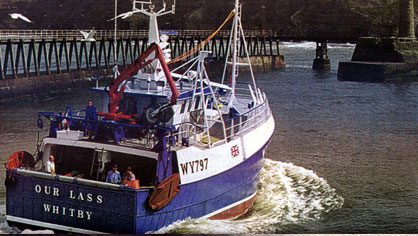7 February 2011
Intense discussions between the NFFO and Defra over the shape of the days-at-sea regime for 2011/12 have yet to reach conclusion.
As talks continue, it has become increasingly clear that the elaborate superstructure that has been created to manage national fishing effort limits, required under the EU Cod Recovery Plan, often undermines the central purpose of achieving the reduction in fishing mortality – regarded as essential for the rebuilding the cod stocks.
As effort allocations to each member state have been reduced year-on-year, to meet the terms of the Cod Management Plan; and as vessel operators struggle to remain viable in any way that they can; the results are often the opposite of that required to rebuild the cod stocks. In other words, the bureaucracy surrounding the cod management plan is frequently an obstacle to achieving the plan’s objective.
Whilst some vessel operators have sought shelter within the Catch Quota projects, which provide additional cod quota and more relaxed effort constraints, others for which this is not an option, are trying to get by as best as they can. Some vessels opt to work outside the cod recovery zone for part of the year to ration their use of days; or move into fisheries where the effort limits are less severe; or spend the significant sums to obtain the days-at-sea that would allow them to remain viable in the main whitefish fisheries. The discard sampling statistics confirm however, that a large part of the fleet when these alternatives run out, fish on as best they can during the period that they are allowed to go to sea – and widespread discarding of cod non-cod demersal species is the result. In other words, the constraints imposed by the cod recovery plan – in terms of an ultra-low TAC backed by effort limits ratcheted down each year – generate divergent responses from the fishery. Some vessels are pushed towards the catch quota projects but others survive by following fishing behaviours thatundermine the purpose of the cod recovery plan.
Whilst vessels within the catch quota schemes are subject to fully documented catches and cannot discard cod, the vessels outside the schemes are subject to extreme financial pressures that often intensify fishing pressures on cod, including widespread discarding. This makes the prospects of quantifying the reduction (if any) of fishing mortality which results from effort constraints a forlorn task. One example illustrates the issue: although the minimum mesh size for targeting the larger whitefish species, such as cod, was increased ten years ago, the average mesh size in use in the North Sea has fallen over the same period. This is explained by vessels which have sought to escape the economic consequences of effort control moving away from the whitefish fisheries into adjacent fisheries like the nephrops (prawn) fisheries that require a smaller mesh size but which will still to some degree or other catch cod as a by-catch.
Sight of a range of perverse consequences like these, is generally lost as the industry and officials are preoccupied with designing an effort scheme that is equitable and consistent with the terms of the cod recovery plan but also gives the fleets some hope of economic viability. This Federation is the strongest advocate of a move away from prescriptive micro-management and towards a fisheries management system based on delegated responsibilities; however, good ideas can be spoiled by poor implementation and here is an example of delegated responsibility at its worst. The Commission, having overseen a failed effort scheme base on flat rate limits (2003 -2008) persuaded ministers that allocating effort to member states in the form of KilowattDays represented increased management “flexibility”. The reality, as effort limits come down year on year, is often the opposite of flexibility and also leads to the kind of perverse outcomes described above.
Impact assessment? What impact assessment?
All this might have been thought through before the adoption of the present effort regime but incredible as it may seen, this, the most intrusive of management measures applied under the CFP since its inception, has never been subject to a formal impact assessment. The use of effort control remains highly reliant on the belief of a small number of officials within the Commission that it is an appropriate instrument in the demersal mixed fisheries. The evidence and the opinion of the industry subject to it, along with the officials who are tasked with managing it, suggest that it is not.
Cod Review
Whether this deeply unsatisfactory situation can be put to rights depends in part on the outcome of the forthcoming review of the cod recovery plan. ICES scientists will shortly begin reviewing their assessment methods in relation to the cod stocks, and shortly after that a joint ICES/STECF working group will examine the broader issues associated with the effectiveness of the cod recovery initiatives to date.
The Federation will participate in these meetings and will ensure that the issues outlined above are raised.

